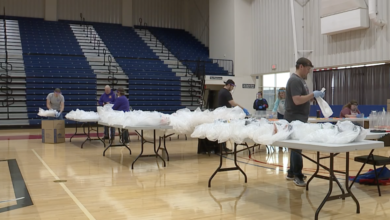

During a regional education panel on Friday, Cincinnati Public Schools director of human resources Julia Indalecio said she got a call that morning from a teacher who will likely resign this year. Her peers in the room, from state education leaders to university professors to suburban superintendents, sighed and nodded their heads in understanding.
'Nothing left... to give': Resignations nearly quadruple among Ohio teachers
Indalecio takes calls like that on a regular basis, she said. What used to be a five-month hiring cycle is now a constant search. Why? There aren't enough teacher candidates. And those who do become teachers nowadays have a different mindset than their predecessors, a more temporary take on the profession ‒ something Indalecio described as a "gig economy."
"I can't make somebody stay in a teaching job that doesn't want to be there," Indalecio said.
Preble Shawnee Local Schools superintendent Todd Bowling is facing similar troubles, worsened by housing issues in his rural community. He said his district went all of the last school year without a seventh-grade math teacher or a high-school geometry teacher. He had candidates for those roles who did not pass the state's reading endorsement certification, even though they'd be teaching math (not reading).
"Where do we draw the line and say let's get people in there (the classroom)?" he said.
The meeting was the first of five to take place over the next week at universities across Ohio, to address the teacher shortage crisis and focus on local solutions. When schools can't recruit and retain high-quality teachers, students suffer academically, emotionally and socially. Class sizes grow. Barriers to learning multiply.
To start the meeting, representatives from Xavier University, Wright State University and the Ohio Department of Education shared alarming statistics about the current trends in teacher retention:
- There are 567,000 fewer teachers in the U.S. today than before the pandemic, according to the U.S. Bureau of Labor Statistics.
- More than half (55%) of current teachers are planning to leave the field earlier than planned, according to a National Education Association survey.
- Ohio saw a 50% drop in students enrolled in teacher training programs between 2010 and 2018, according to the Center for American Progress.
- While 17% of Ohio's students identify as Black, just 4.3% of the state's teachers are Black.
These problems aren't new since the pandemic, but are worse. The pandemic exacerbated an already "delicate situation," Xavier's school of education director Kathleen Winterman said.
School leaders know why teachers are leaving. Several themes were noted during Friday's three-hour session as barriers to teacher retention:
- High costs associated with college, teacher training programs and state certification tests.
- Limited flexibility within the certification process when teachers cross state lines, or wish to change grade levels.
- Low compensation.
- School culture and harmful rhetoric like anti-critical race theory movements that suggest teachers are not equipped to teach subjects they've been trained to teach.
- School funding issues.
- Mental health concerns.
- Competition between districts due to the state's report card ranking system.
- Burnout.
- School safety concerns.
"How are we creating environments that support new teachers?" Indalecio asked her peers.
Allison Miller, a Miami University student studying to become a teacher, was part of Friday's panel. She said she appreciates her professors' honesty about the challenges that come with teaching. But despite her passion to make a difference, she's scared of burning out in her first few years on the job.
"The idea that I'm going into a career that in five to 10 years I could hate ... is intimidating," Miller said.
The Admiral Squad
Three men in purple hoodies stood out from the business casual-clad educators in the room. They are part of Middletown City School District's Admiral Squad, a group dedicated to recruiting, supporting and celebrating Black, male educators.
Middletown has bucked the declining teacher retention trend. The district had a 95% retention rate before the pandemic, superintendent Marlon Styles said, which has since dipped slightly to a rate of 89%. They are still working to bring in more high school math teachers and substitute teachers.
Styles is dedicated to growing the teacher candidate pool and diversifying it. That's why Middletown started the Admiral Squad, he said. It provides a space for Black men in the field to lean on each other, share their experiences and lift each other up.
"It's a space where we get to be our authentic selves," Styles said.
Representation matters, Styles said. When Black boys have Black men teaching them at school, they can gain the confidence to become teachers themselves.
The district is committed to hiring and recruiting several more Black men to teach at Middletown over the next five years.
"We have to do something different," Styles said.
The education sector's wish list for teacher retention
Moon Shot for Equity: Miami, NKU, Cincinnati State, Gateway partner to eliminate equity gap in higher education
Literacy Lab:100 men of color to tutor Cincinnati preschoolers in new program
For most of the issues that were voiced during Friday's meeting, there were solutions proposed:
- Start recruiting future teachers early in their high school careers and provide financial assistance to students who want to become teachers. A partnership between Cincinnati Public Schools and Miami University is doing just that.
- Waive tuition for students' semester of student teaching. (And pay them for student teaching).
- Lower teacher license renewal fees.
- Consider more flexible school schedules.
- Provide mental health support for teachers.
- Build inclusive, supportive school cultures and especially lift up new teachers during their first three years on the job.
- K-12 schools should partner with universities to offer mentor programs between prospective teachers and current educators.
- Leverage community colleges, which already have more diverse student bodies, to partner with universities and put kids on tracks to become teachers.
- Revamp the state's certification testing system and reduce the cost of certification testing.
Some of these ideas have been talked about for two decades or more, Dayton Public Schools superintendent Elizabeth Lolli said. The rest of the room agreed.
"We just have to do it," Cincinnati State Technical and Community College professor Kelly Hubbard said. "We have to stop talking about it and we have to take action."
Four additional meetings to address Ohio's teacher shortage will be hosted by other Ohio universities in the next week:
- Ohio University will host a meeting on Saturday at Ridges Auditorium in Athens.
- The Ohio State University will host a meeting on Nov. 3 at the Fawcett Event Center in Columbus.
- The University of Akron will host a meeting on Nov. 3 at Jean Hower Taber Student Union in Akron.
- Bowling Green State University will host a meeting on Nov. 4 at Bowen Thompson Student Union in Bowling Green.
Source link








